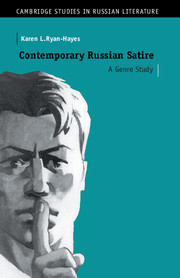Book contents
- Frontmatter
- Contents
- Acknowledgments
- Note on the translation
- Introduction
- 1 Iskander's transparent allegory: Rabbits and Boa Constrictors
- 2 Beyond picaresque: Erofeev's Moscow–Petushki
- 3 Satire and the autobiographical mode: Limonov's It's Me, Eddie
- 4 The family chronicle revisited: Dovlatov's Ours
- 5 Dystopia redux: Voinovich and Moscow 2042
- Conclusion
- Notes
- Select bibliography
- Index
- CAMBRIDGE STUDIES IN RUSSIAN LITERATURE
5 - Dystopia redux: Voinovich and Moscow 2042
Published online by Cambridge University Press: 10 September 2009
- Frontmatter
- Contents
- Acknowledgments
- Note on the translation
- Introduction
- 1 Iskander's transparent allegory: Rabbits and Boa Constrictors
- 2 Beyond picaresque: Erofeev's Moscow–Petushki
- 3 Satire and the autobiographical mode: Limonov's It's Me, Eddie
- 4 The family chronicle revisited: Dovlatov's Ours
- 5 Dystopia redux: Voinovich and Moscow 2042
- Conclusion
- Notes
- Select bibliography
- Index
- CAMBRIDGE STUDIES IN RUSSIAN LITERATURE
Summary
“Take Orwell, for example. Didn't he predict in detail the system that exists in Russia today?” “Of course not,” I said. “Orwell wrote a parody of what already existed at the time. He described a totalitarian machine that worked perfectly and could simply never exist in a real human society.”
Vladimir Voinovich: Moscow 2042Born in 1932 in Dushanbe, the capital city of Tadzhikistan (at that time Stalinabad), Vladimir Nikolaevich Voinovich is one of the most popular and prolific of contemporary Russian satirists. In respect to his style and his thematics, he has often been compared to Gogol′. Both in his homeland and in emigration, Voinovich has subjected the Soviet system to caustic and often very funny satirical scrutiny. Nevertheless, he has consistently resisted wearing the mantle of satirist, arguing that he merely depicts reality — absurd, often grotesque reality — “as it is.”
A formative event in what he has called an “ordinary” youth was the arrest and imprisonment of his father when he was still a small child. When his father was released and rehabilitated after five years (which was actually quite extraordinary), his family resettled in Ukraine. Voinovich managed only seven years of formal education while he was growing up and began working at the age of eleven.
- Type
- Chapter
- Information
- Contemporary Russian SatireA Genre Study, pp. 193 - 238Publisher: Cambridge University PressPrint publication year: 1996



